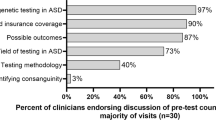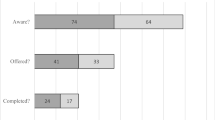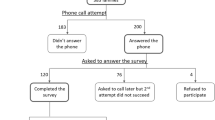Abstract
Reasons for the underutilization of genetics services by families of children with autism spectrum disorders (ASD) are not well understood. We report the identification of factors associated with this underuse. Survey-based study of parents and/or guardians of children with ASD. One hundred fifty-five families completed the questionnaire. Thirty-one of 155 (20%) children had seen a genetics professional. Forty-nine of 154 (32%) children had undergone genetic testing. Parents whose child saw a genetics professional were more likely to 1) Have a primary provider refer for or suggest a genetics evaluation 2) Have asked for a referral, and/or 3) Know another person with a genetic cause of ASD. amilies of children with ASD who have not received genetics services are less aware of their availability and utility. They are also less likely to have their provider recommend a clinical genetics evaluation. Efforts should be taken to increase awareness of both health providers and parents regarding the usefulness of genetics services for ASD.
Similar content being viewed by others
References
Abdul-Rahman, O. A., & Hudgins, L. (2006). The diagnostic utility of a genetics evaluation in children with pervasive developmental disorders. Genetics in Medicine, 8(1), 50–54.
American Psychiatric Association (2000). Diagnostic and statistical manual of mental disorders, Fourth Edition, Text Revision. Washington: DC.
Bailey, A., Le Couteur, A., Gottesman, I., Bolton, P., Simonoff, E., Yuzda, E., & Rutter, M. (1995). Autism as a strongly genetic disorder: evidence from a British twin study. Psychological Medicine, 25(1), 63–77.
Barbaresi, W. J., Katusic, S. K., & Voigt, R. G. (2006). Autism: a review of the state of the science for pediatric primary health care clinicians. Archives of Pediatrics & Adolescent Medicine, 160(11), 1167–1175.
Cappelli, M., Surh, L., Humphreys, L., Verma, S., Logan, D., Hunter, A., & Allanson, J. (1999). Psychological and social determinants of women's decisions to undergo genetic counseling and testing for breast cancer. Clinical Genetics, 55(6), 419–430.
Challman, T. D., Barbaresi, W. J., Katusic, S. K., & Weaver, A. (2003). The yield of the medical evaluation of children with pervasive developmental disorders. Journal of Autism and Developmental Disorders, 33(2), 187–192.
Chudley, A. E., Gutierrez, E., Jocelyn, L. J., & Chodirker, B. N. (1998). Outcomes of genetic evaluation in children with pervasive developmental disorder. Journal of Developmental and Behavioral Pediatrics, 19(5), 321–325.
Culver, J., Burke, W., Yasui, Y., Durfy, S., & Press, N. (2001). Participation in breast cancer genetic couneeling: the influence of educational level, ethnic background and risk perception. Journal of Genetic Counseling, 10(3), 215–231.
Edwards, C. (2003). Diversity and cultural competence, Part 2: Issues of practical conceptualization and implementation. The North Carolina Psychologist, November-December 2003.
Elder, J. H. (2001). A follow-up study of beliefs held by parents of children with pervasive developmental delay. Journal of Child and Adolescent Psychiatric Nursing, 14(2), 55–60.
Esser-Stuart, J. E., & Lyons, M. A. (2002). Barriers and influences in seeking health care among lower income minority women. Social Work in Health Care, 35(3), 85–99.
Filipek, P. A., Accardo, P. J., Ashwal, S., Baranek, G. T., Cook, E. H., Jr., Dawson, G., Gordon, B., et al. (2000). Practice parameter: screening and diagnosis of autism: report of the Quality Standards Subcommittee of the American Academy of Neurology and the Child Neurology Society. Neurology, 55(4), 468–479.
Folstein, S. E., & Rosen-Sheidley, B. (2001). Genetics of autism: complex aetiology for a heterogeneous disorder. Nature Reviews. Genetics, 2(12), 943–955.
Glanz, K., Rimer, B. K., & Lewis, F. M. (2002). Health behavior and health education: theory, research, and practice (3rd ed.). San Francisco: Jossey-Bass.
Gray, D. E. (1995). Lay conceptions of autism: parents' explanatory models. Medical Anthropology, 16(2), 99–118.
Gupta, A. R., & State, M. W. (2007). Recent advances in the genetics of autism. Biological Psychiatry, 61(4), 429–437.
Hallmayer, J., Cleveland, S., Torres, A., Phillips, J., Cohen, B., Torigoe, T., et al. (2011). Genetic Heritability and Shared Environmental Factors Among Twin Pairs With Autism. Arch Gen Psychiatry. Online first, E1-E8.
Harrington, J. W., Patrick, P. A., Edwards, K. S., & Brand, D. A. (2006). Parental beliefs about autism: implications for the treating physician. Autism, 10(5), 452–462.
Harrington, J. W., Rosen, L., Garnecho, A., & Patrick, P. A. (2006). Parental perceptions and use of complementary and alternative medicine practices for children with autistic spectrum disorders in private practice. Journal of Developmental and Behavioral Pediatrics, 27(2 Suppl), S156–161.
Herman, G. E., Henninger, N., Ratliff-Schaub, K., Pastore, M., Fitzgerald, S., & McBride, K. L. (2007). Genetic testing in autism: how much is enough? Genetics in Medicine, 9(5), 268–274.
Johnson, C. P., & Myers, S. M. (2007). Identification and evaluation of children with autism spectrum disorders. Pediatrics, 120(5), 1183–1215.
Jorde, L. B., Mason-Brothers, A., Waldmann, R., Ritvo, E. R., Freeman, B. J., Pingree, C., McMahon, W. M., et al. (1990). The UCLA-University of Utah epidemiologic survey of autism: genealogical analysis of familial aggregation. American Journal of Medical Genetics, 36(1), 85–88.
Kelly, A. M., Kratz, B., Bielski, M., & Rinehart, P. M. (2002). Implementing transitions for youth with complex chronic conditions using the medical home model. Pediatrics, 110(6 Pt 2), 1322–1327.
Kinney, A. Y., Gammon, A., Coxworth, J., Simonsen, S. E., & Arce-Laretta, M. (2010). Exploring attitudes, beliefs, and communication preferences of Latino community members regarding BRCA1/2 mutation testing and preventive strategies. Genetics in Medicine, 12(2), 105–115.
Kogan, M. D., Strickland, B. B., Blumberg, S. J., Singh, G. K., Perrin, J. M., & van Dyck, P. C. (2008). A national profile of the health care experiences and family impact of autism spectrum disorder among children in the United States, 2005–2006. Pediatrics, 122(6), e1149–1158.
Krauss, M. W., Gulley, S., Sciegaj, M., & Wells, N. (2003). Access to specialty medical care for children with mental retardation, autism, and other special health care needs. Mental Retardation, 41(5), 329–339.
Lerman, C., Schwartz, M. D., Lin, T. H., Hughes, C., Narod, S., & Lynch, H. T. (1997). The influence of psychological distress on use of genetic testing for cancer risk. Journal of Consulting and Clinical Psychology, 65(3), 414–420.
Lerman, C., Croyle, R. T., Tercyak, K. P., & Hamann, H. (2002). Genetic testing: psychological aspects and implications. Journal of Consulting and Clinical Psychology, 70(3), 784–797.
Lichtenstein, P., Carlstrom, E., Rastam, M., Gillberg, C., & Anckarsater, H. (2010). The genetics of autism spectrum disorders and related neuropsychiatric disorders in childhood. The American Journal of Psychiatry, 167(11), 1357–1363.
MacNew, H. G., Rudolph, R., Brower, S. T., Beck, A. N., & Meister, E. A. (2010). Assessing the knowledge and attitudes regarding genetic testing for breast cancer risk in our region of southeastern Georgia. The Breast Journal, 16(2), 189–192.
Marcus, L., Garfinkle, A., & Wolery, M. (2002). Issues in Early Diagnosis and Intervention with Young Children with Autism. In E. Schopler, & N. Yirmiya, (Eds.), The research basis for autism intervention, 171–185.
Martinez, M. a. C. R. (2010). Health insurance coverage: early release of estimates from the national health interview survey, January–September 2009. National Center for Health Statistics, Division of Health Interview Statistics.
McConkie-Rosell, A., Finucane, B., Cronister, A., Abrams, L., Bennett, R. L., & Pettersen, B. J. (2005). Genetic counseling for fragile x syndrome: updated recommendations of the national society of genetic counselors. Journal of Genetic Counseling, 14(4), 249–270.
McEachin, J. J., Smith, T., & Lovaas, O. I. (1993). Long-term outcome for children with autism who received early intensive behavioral treatment. American Journal of Mental Retardation, 97(4), 359–372. discussion 373–391.
McGrath, R. J., Laflamme, D. J., Schwartz, A. P., Stransky, M., & Moeschler, J. B. (2009). Access to genetic counseling for children with autism, Down syndrome, and intellectual disabilities. Pediatrics, 124(Suppl 4), S443–449.
Medical Home Initiatives for Children With Special Needs Project Advisory Committee (2002). The Medical Home Pediatrics, 110(1 Pt 1), 184–186.
Meiser, B. (2005). Psychological impact of genetic testing for cancer susceptibility: an update of the literature. Psycho-Oncology, 14(12), 1060–1074.
Mercer, L., Creighton, S., Holden, J. J., & Lewis, M. E. (2006). Parental perspectives on the causes of an autism spectrum disorder in their children. Journal of Genetic Counseling, 15(1), 41–50.
Mulvihill, B. A., Altarac, M., Swaminathan, S., Kirby, R. S., Kulczycki, A., & Ellis, D. E. (2007). Does access to a medical home differ according to child and family characteristics, including special-health-care-needs status, among children in Alabama? Pediatrics, 119(Suppl 1), S107–113.
Palmer, C. G., Lueddeke, J. T., & Zhou, J. (2009). Factors influencing parental decision about genetics evaluation for their deaf or hard-of-hearing child. Genetics in Medicine, 11(4), 248–255.
Pletcher, B. A., Toriello, H. V., Noblin, S. J., Seaver, L. H., Driscoll, D. A., Bennett, R. L., & Gross, S. J. (2007). Indications for genetic referral: a guide for healthcare providers. Genetics in Medicine, 9(6), 385–389.
Press, N. A., Yasui, Y., Reynolds, S., Durfy, S. J., & Burke, W. (2001). Women's interest in genetic testing for breast cancer susceptibility may be based on unrealistic expectations. American Journal of Medical Genetics, 99(2), 99–110.
Prevalence of autism spectrum disorders—Autism and Developmental Disabilities Monitoring Network, United States, 2006. (2009). MMWR Surveill Summ, 58(10), 1–20.
Riedijk, S. R., de Snoo, F. A., van Dijk, S., Bergman, W., van Haeringen, A., Silberg, S., van Elderen, T. M., et al. (2005). Hereditary melanoma and predictive genetic testing: why not? Psycho-Oncology, 14(9), 738–745.
Ronald, A., Happe, F., Bolton, P., Butcher, L. M., Price, T. S., Wheelwright, S., Baron-Cohen, S., et al. (2006). Genetic heterogeneity between the three components of the autism spectrum: a twin study. Journal of the American Academy of Child and Adolescent Psychiatry, 45(6), 691–699.
Rosen, B., Wolpert, S., Donnelly, M., Pericak-Vance, V. A., & Folstein, S. (2000). Surveying parents of children with autism: what is their understanding of the genetic basis for this disorder? Journal of Genetic Counseling, 9(9), 547.
Rosen-Sheidley, B., Wolpert, C., Fiego-Schiffman, J., Palmer, C., Folstein, S., & Pericak-Vance, M. (2002). Web-based survey of families with autism: reassessing the need for genetic education. Journal of Genetic Counseling, 11(6), 488.
Ruble, L. A., Heflinger, C. A., Renfrew, J. W., & Saunders, R. C. (2005). Access and service use by children with autism spectrum disorders in Medicaid Managed Care. Journal of Autism and Developmental Disorders, 35(1), 3–13.
Rutter, M., Bailey, A., Simonoff, E., & Pickles, A. (1997). Genetic influences and autism. In D. J. Cohen & F. R. Volkmar (Eds.), Autism and pervasive developmental disorders.
Schaefer, G. B., & Lutz, R. E. (2006). Diagnostic yield in the clinical genetic evaluation of autism spectrum disorders. Genetics in Medicine, 8(9), 549–556.
Schaefer, G. B., & Mendelsohn, N. J. (2008). Clinical genetics evaluation in identifying the etiology of autism spectrum disorders. Genetics in Medicine, 10(4), 301–305.
Selkirk, C. G., McCarthy Veach, P., Lian, F., Schimmenti, L., & LeRoy, B. S. (2009). Parents’ perceptions of autism spectrum disorder etiology and recurrence risk and effects of their perceptions on family planning: recommendations for genetic counselors. Journal of Genetic Counseling, 18(5), 507–519.
Simon, M. S., & Petrucelli, N. (2009). Hereditary breast and ovarian cancer syndrome: the impact of race on uptake of genetic counseling and testing. Methods in Molecular Biology, 471, 487–500.
Simonoff, E. (1998). Genetic counseling in autism and pervasive developmental disorders. Journal of Autism and Developmental Disorders, 28(5), 447–456.
Szatmari, P., Paterson, A. D., Zwaigenbaum, L., Roberts, W., Brian, J., Liu, X. Q., et al. (2007). Mapping autism risk loci using genetic linkage and chromosomal rearrangements. Nature Genetics, 39(3), 319–328.
Taniai, H., Nishiyama, T., Miyachi, T., Imaeda, M., & Sumi, S. (2008). Genetic influences on the broad spectrum of autism: study of proband-ascertained twins. American Journal of Medical Genetics. Part B, Neuropsychiatric Genetics, 147B(6), 844–849.
Thomas, K. C., Ellis, A. R., McLaurin, C., Daniels, J., & Morrissey, J. P. (2007). Access to care for autism-related services. Journal of Autism and Developmental Disorders, 37(10), 1902–1912.
Wang, G., & Watts, C. (2007). Genetic counseling, insurance status, and elements of medical home: analysis of the national survey of children with special health care needs. Maternal and Child Health Journal, 11(6), 559–567.
Whitelaw, C., Flett, P., & Amor, D. J. (2007). Recurrence risk in Autism Spectrum Disorder: a study of parental knowledge. Journal of Paediatrics and Child Health, 43(11), 752–754.
Wieder, S., & Greenspan, S. I. (2003). Climbing the symbolic ladder in the DIR model through floor time/interactive play. Autism, 7(4), 425–435.
Acknowledgements
Subjects were recruited with the assistance of the Autism and Developmental Disabilities Clinic at Stanford University and the Interactive Autism Network (IAN) Project at the Kennedy Krieger Institute, Baltimore, Maryland. We also wish to acknowledge Raymond R. Balise and Catherine Ley at Stanford University for assistance in statistical analysis methods. Lastly, we wish to thank the survey respondents for their participation in this research. This work was supported by funding through the MS Program in Human Genetics and Genetic Counseling at Stanford University.
Disclosure of interest
The authors have no conflicts of interest or disclosures to declare in relation to this manuscript. The authors have full control of all primary data and agree to allow the journal to review this data if requested.
Author information
Authors and Affiliations
Corresponding author
Electronic supplementary material
Below is the link to the electronic supplementary material.
Table SI
Factors Influencing Utilization of Genetics Services for Autism Spectrum Disorders. (PDF 153 kb)
FigS1
Influences on Use of Genetics Services for Families of Children with Autism Spectrum Disorders. (PDF 102 kb)
FigS2
Utilization of Genetic Testing. (PDF 269 kb)
FigS3
Referral and Primary Provider Role. (PDF 147 kb)
FigS4
Parental Awareness. (PDF 118 kb)
Rights and permissions
About this article
Cite this article
Vande Wydeven, K., Kwan, A., Hardan, A.Y. et al. Underutilization of Genetics Services for Autism: The Importance of Parental Awareness and Provider Recommendation. J Genet Counsel 21, 803–813 (2012). https://doi.org/10.1007/s10897-012-9494-x
Received:
Accepted:
Published:
Issue Date:
DOI: https://doi.org/10.1007/s10897-012-9494-x




